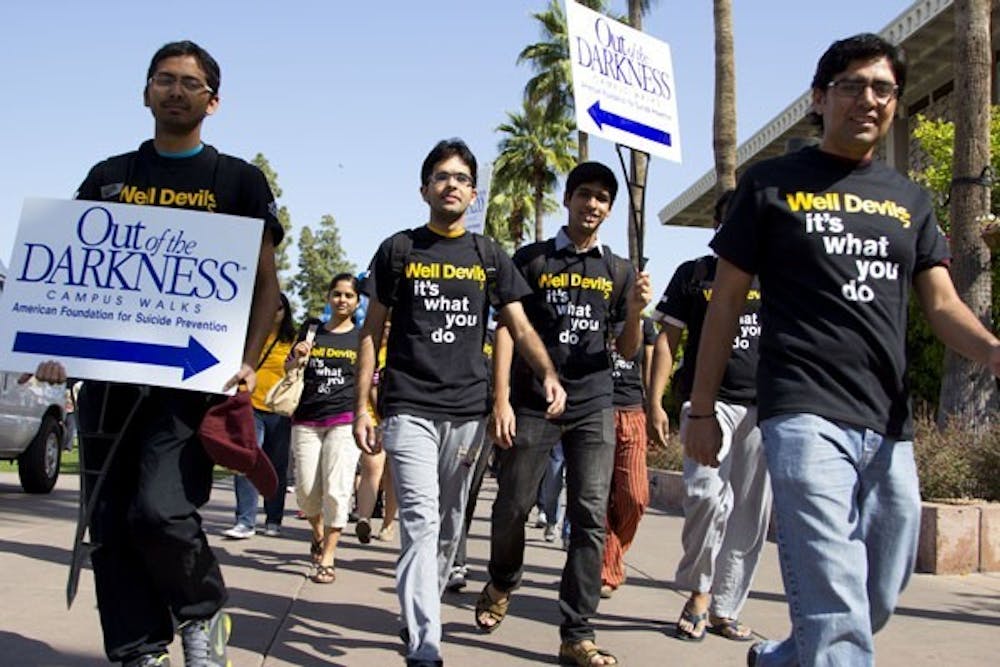On March 18, ASU students and other community members are participating in the Out of Darkness Walk on the Student Services Lawn to show support for those who have been impacted by suicide and open the door to conversations about mental health.
The hope of the walk is to normalize the conversation about suicide, the importance of suicide prevention and mental health in general.
Funds raised at the walk will go to the American Foundation for Suicide Prevention, assisting the group in funding research, creating educational programs and supporting those who lost someone to suicide. According to the website for the event, more than $12,000 had been raised as of Thursday evening.
"When people are suicidal, they are in a place where they feel alone and hopeless and what this (event) does is bring community around, showing people that they're not alone, and not only that, but there is hope out there, leading into the light … therefore … out of the darkness," said Emily Hinsberger, an ASU graduate student studying mental health counseling and co-founder of Devils4Devils.
The event, one of many events of its kind across the nation, is run by Hinsberger and hosted by Devils4Devils, the Accessibility Coalition, IfYou'reReadingThis.org and the American Foundation for Suicide Prevention.
"What (the) Out of the Darkness Walk does really fluidly is it brings all the many ways we're impacted by suicide forward," said Erin Trujillo, assistant vice president for health and wellness and director of ASU Counseling Services. "The fact that (the) community gathers and honors all the ways suicide impacts every individual within that community is part of the mission of Out of the Darkness."
Hinsberger and Trujillo said that starts with community. Devils4Devils, a student-led organization that works to foster peer connections to improve mental health, was created with that in mind — a space for students to connect with one another and practice empathy.
According to Hinsberger, empathy is something everyone is capable of. Feeling seen, heard and being able to share emotions with others is what makes empathy a powerful connective force.
"I know that when I walk what I really want to do is spread empathy like wildflowers, and let people know that there are seeds of empathy within them," Hinsberger said.
READ MORE: Suicide prevention walk brings 200 supporters, raises over $7K
The first step to suicide prevention is when a trusted friend or loved one notices someone acting differently and talks to them about it, according to Trujillo.
"When a person who is naturally connected to someone checks in to ask if they're OK and asks if they're having suicidal thoughts, that action is a huge act of prevention because more often than not, a person will tell someone who cares about them what they're thinking," Trujillo said.
Other ASU students, such as former ASU student Trip Rexx, are finding different ways to hold space for the often difficult conversation.
Rexx, who is a musician and rapper, has the conversation through music. It's his way of bringing light to mental health after having a personal experience with suicidal thoughts.
"That definitely made me want to shed some light on it in my music. That became my mission: To help people deal with and help people not feel alone when they're dealing with these issues," he said.
Not only the conversation, but the language is shifting when it comes to psychological well-being, with the focus less on "mental illness" and instead on overall "mental health."
High school and college students have been changing the language scope by focusing on mental health as "any array of emotional or social or psychological circumstances," and making it a point among peers, Trujillo said.
"That someone can still have mental health needs and not have a mental illness is part of the nuance that I believe is being ushered in by our current teen and 20-somethings and it's decreasing barriers to conversation, barriers to normalization, barriers to connection and barriers to care," Trujillo said.
Bringing these topics to light is a large part of the mission of the student-run event. On March 18, the walking crowds will be a part of a national suicide prevention effort.
"There's people that want to be there for you, and not only that, but have a conversation about it," Hinsberger said.
Editor’s note: The National Suicide Prevention Lifeline’s phone number is 1-800-273-8255. Crisis Text Line can be reached by texting HOME to 741741. ASU’s crisis resources including the EMPACT 24-hour crisis line are accessible here.
Edited by Sadie Buggle, Piper Hansen, Greta Forslund and Caera Learmonth.
Reach the reporter at kbartune@asu.edu and follow @BartunekKaren on Twitter.
Like The State Press on Facebook and follow @statepress on Twitter.




